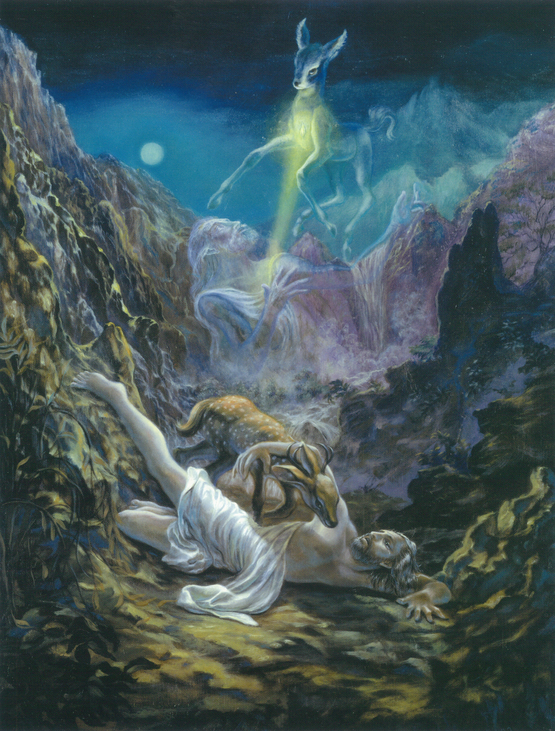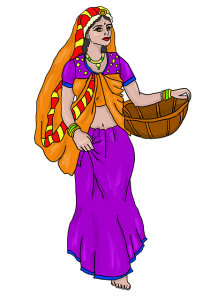

Chapter 8, verse 6 from Śrīmad Bhagavad-gītā, Tāraka-Brahma-Yoga, 4th edition, by Śrīla Bhaktivedānta Nārāyaṇa Mahārāja
yyaṁ yaṁ vāpi smaran bhāvaṁ
tyajaty ante kalevaram
taṁ tam evaiti kaunteya
sadā tad-bhāva-bhāvitaḥ
Whatever one remembers at the time of giving up the material body, O son of Kuntī, one is sure to attain that same state again, due to being always absorbed in such contemplation.
SĀRĀRTHA-VARṢIṆĪ: “Just as one attains Me by remembering Me exclusively, similarly, one attains the state corresponding to whatever else or whoever else one remembers.” To explain this, Śrī Bhagavān is speaking these words yaṁ yaṁ. People are absorbed in a particular state of existence due to remembrance of it through continuous meditation on it.
SĀRĀRTHA-VARṢIṆĪ PRAKĀŚIKĀ-VṚTTI: By remembering Bhagavān at the time of death, one attains His nature. Similarly, one attains a nature corresponding to the other beings and objects one remembers [at the time of death]. Bharata Mahārāja thought of a young deer at the time of death, and in his next life he received the body of a deer. For this reason, at the time of death, one must not think of anything except Bhagavān. To attain such consciousness, it is imperative that one endeavour in this direction from the very beginning of one’s life. Although Bharata Mahārāja was a devotee of high calibre, being situated on the platform of bhāva, he was  reborn as a young deer by the will of the Lord to set an example for humanity. Then, in his next two births, he completely avoided the association of materialistic persons, because he was able to remember his past life. Thus he remained engaged in the cultivation of bhakti. The ordinary jīvas, who are bound by the results of their actions, or karma, should take a good lesson from the example of Bharata Mahārāja and should not commit any offence at his feet, thinking him to be bound by the result of his karma as they are.
reborn as a young deer by the will of the Lord to set an example for humanity. Then, in his next two births, he completely avoided the association of materialistic persons, because he was able to remember his past life. Thus he remained engaged in the cultivation of bhakti. The ordinary jīvas, who are bound by the results of their actions, or karma, should take a good lesson from the example of Bharata Mahārāja and should not commit any offence at his feet, thinking him to be bound by the result of his karma as they are.
Śrīmad-Bhāgavatam also relates the story of Purañjana, who attained the body of a woman in his next life, all because he was thinking of a woman at the time of death. Actually, whatever we do in the course of our lives influences our consciousness at the time of death, and we take another birth accordingly. This is why sādhakas should chant the holy name and practise pure devotion in this life so that at the time of death, their intense remembrance of Bhagavān will guide them on the path of auspiciousness.

Excerpt from the book Ācārya Kesarī Śrī Śrīmad Bhakti Prajñāna Keśava Gosvāmī – His Life and Teachings, 2nd Edition by Śrīla Bhaktivedānta Nārāyaṇa Mahārāja (page 341)
It is like the strong bhṛṅgī wasp forcefully arresting the weak telacaṭṭā insect and confining it in its cave. When  the weak insect hears the strange sound made by the bhṛṅgī, it becomes afraid, and constantly contemplating the form of the bhṛṅgī, it assumes a bodily form exactly like that of the bhṛṅgī.
the weak insect hears the strange sound made by the bhṛṅgī, it becomes afraid, and constantly contemplating the form of the bhṛṅgī, it assumes a bodily form exactly like that of the bhṛṅgī.
We can also give the example of Mahārāja Bharata, who was thinking of a fawn at the time of his death and so acquired the body of a deer in his next life.
Image/Art made possible by Pixabay.com & Krishnapath.org








